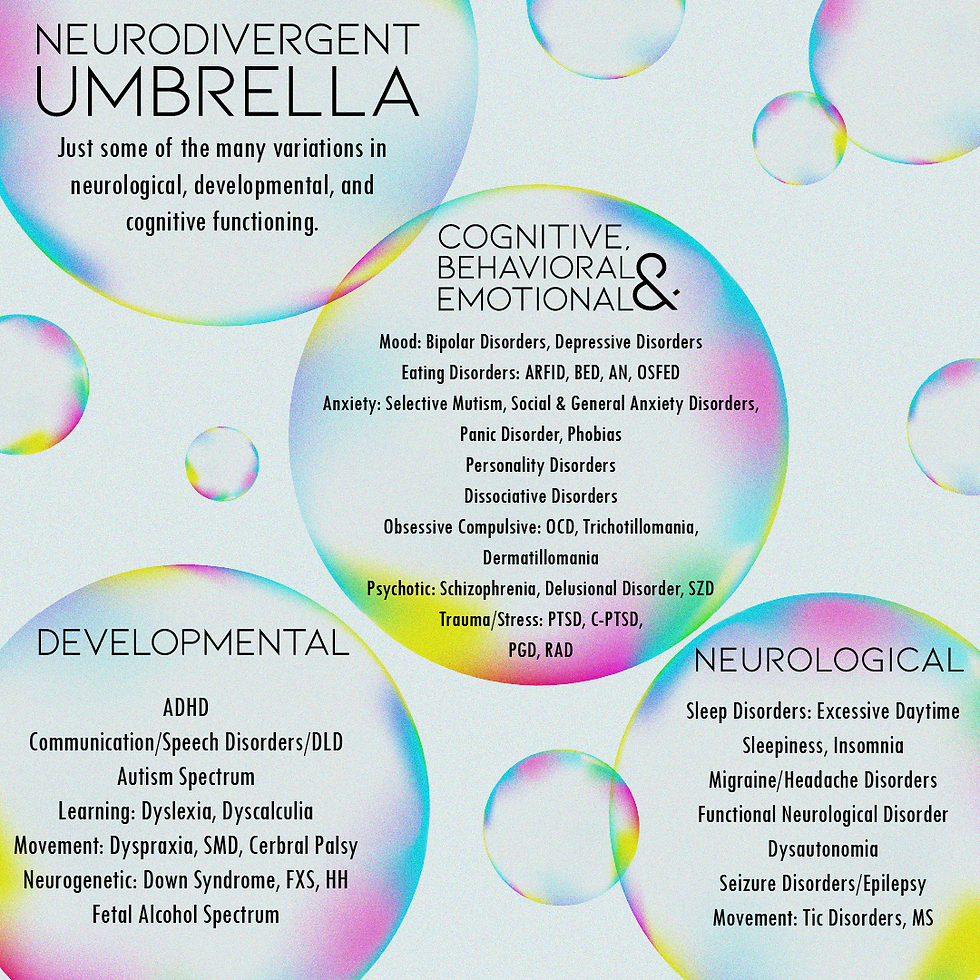10 Signs You Might Be Neurodivergent
- Sam Johnson

- Jul 1, 2023
- 2 min read
How do I know if I’m neurodivergent?
Do I need a diagnosis to call myself neurodivergent?
What are the signs of being neurodivergent?
If you’ve asked yourself any of those questions, then there’s a good chance you’re neurodivergent. It’s common for neurodivergent people to wonder why they’re different then their peers, especially if they weren’t diagnosed as a child. To begin, you need to have a strong understanding of what neurodiversity is.
What is Neurodiversity?
Neurodiversity is a concept that recognizes and values the natural variation in neurological conditions, thinking styles, and patterns of behavior in individuals. It suggests that neurological differences such as autism, ADHD, dyslexia, etc. are a normal variation of the human brain instead of being regarded as abnormalities or disorders. Neurodiversity emphasizes the need to create an inclusive environment that accommodates the unique requirements of individuals with neurodivergent conditions and believes that such individuals can contribute greatly to society when provided with appropriate support and resources. This concept seeks to promote empowerment, understanding, and appreciation of neurodiversity in all aspects of life.
Simply put: Neurodiversity is not a diagnosis or a disorder. It is a broad spectrum of characteristics, behaviors, thinking styles, and conditions that are diverse from society’s view of neurotypical.
How Do I Know if I’m Neurodivergent?
If you’re asking yourself this question- it probably means you are. Neurotypical people do not spend a lot of time thinking about their neurotype or cognitive differences. It’s common for neurodivergent people to spend years questioning their neurotype, especially if they haven’t received any diagnoses.
You don’t need a diagnosis to be neurodivergent.
As stated before, neurodiversity is a collection of different conditions and ways of behaving and thinking that are diverse from societal norms. That being said, your neurodivergent brain is different from everyone else’s. Even if two people have the same diagnosis, their neurotype is still diverse. However, there is a lot of common traits and characteristics within neurodivergent people that can give you an idea of whether you might be neurodivergent or not.
10 Signs of Being Neurodivergent:
Finding social situations and interactions difficult or anxiety-producing
Struggling with reading, writing, or comprehension
Clumsiness
Having difficulty focusing on things that aren’t interesting to you
Difficulty with sleeping
Becoming overstimulated by sounds, smells, lights, or textures
Having intense interests or obsessions
Having low empathy or extreme empathy
Difficulty with communication
Strong pattern recognition skills This is not an exhaustive list of neurodivergent traits, and characteristics differ between each person and diagnosis.
What Should I Do Next if I Think I’m Neurodivergent?
If you have a strong feeling that you are neurodivergent and want a more definitive answer, you can start by taking online quizzes and free assessments. Here are some links to our favorite ones:
Autism
ADHD
OCD
Anxiety
Bipolar
Personality Disorders
PTSD/CPTSD
Once you’ve done more research into what neurodivergent conditions you might have, it’s important to speak to a mental health professional if you’re struggling. Getting a diagnosis is difficult and not accessible to many people, however, it’s important to talk to others about your struggles if you need accommodations or help.
And remember, being neurodivergent is not wrong or bad. You are not disordered, no matter what your diagnosis may be called. Finding a name for your struggles can help you find support and accommodations, but don’t let a diagnosis take away your value.




Comentarios